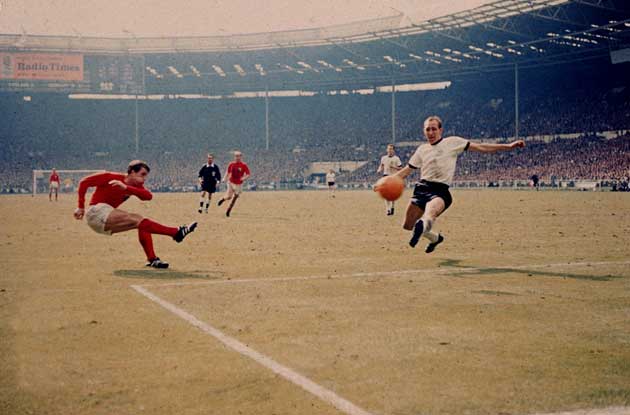Why did the Bundesliga turn down goal line technology?
The introduction of the technology has been ruled out by the clubs

For a country which has suffered at the hands of both the most famous contentious goal line decision in history, and the worst one of the current season, Germany is curiously ambivalent towards goal line technology.
One would have thought, with Geoff Hurst and Stefan Kießling in mind, that Monday’s vote in Frankfurt over the introduction of technology would have been a no brainer. Indeed, even the German press were predicting, reluctantly in some corners, a landslide victory for the yaysayers.
In his press conference on Monday morning, Pep Guardiola, German football’s main ambassador in the Brave New World of Modern Football, voiced his own support, while Bayern’s press officer Markus Hörwick confirmed that Bayern would be voting for technology later in the afternoon.
As it turned out, they were one of few who did. Of the 36 clubs in Germany’s top two divisions, only 12 voted for technology, thereby wildly falling short of the required two thirds majority needed to pass the motion. The Bundesliga itself was split down the middle, with nine clubs voting for, and nine against.
It is a decision which has hardly inspired outrage in Germany. Unlike issues such as fan culture, stadium experience and member ownership of clubs, goal line technology simply does not get the blood pumping in Germany. The debate is there, of course, and has become more pertinent since Kießling’s “ghost goal” against Hoffenheim last autumn, but it simply isn’t such an emotionally disputed question as it is in England.
Those in support, such as Guardiola, are tame with their endorsements. Those against, such as Eintracht Frankfurt chairman Heribert Bruchhagen, diplomatically refer to it as “not yet advanced enough”. Some are on the fence. One Bild editor today declared that it would have been “lazy compromise anyway”, suggesting video referrals instead, while DFL Chief Executive Christian Seifert remarked that “the Bundesliga doesn’t live or die on the basis of technology”.
Germany is not a perfect football culture. The 50+1 rule is riddled with loopholes and weaknesses, while the Bundesliga is no stranger to the same “Best League in the World” arrogance which has long plagued the Premier League. But one cannot help but think that, in this case, it is worth taking a leaf from their book.
There are, contrary to popular belief, many arguments against goal line technology. Aside from all questions over accuracy, however, the single most powerful is that it is superfluous and vastly expensive. In a global game so riddled by corruption, rampant exploitation of its consumers and an inflated sense of its own worth, one wonders how “desperate” the need for accuracy over the occasional disputed goal really is.
That, perhaps, is what we can take from Germany’s rejection of technology today. Rather than huffing, puffing and parping indignantly about referees, about diving, about surrounding the referee, German football gets its knickers in a twist over bigger issues. At the Fankongress in Berlin last January, there was real discussion between journalists, high profile DFB officials and fans alike about everything from the ownership structures of clubs to police presence and violence in stadiums.
Of course these discussions do not create a utopia in themselves. Indeed, the Fankongress is a fine example of how they often take a long time to go anywhere at all. But they are at least real discussions, about real issues in football. That such ambition is not always successful does not mean it is not positive.
Both the Bundesliga and the Premier League have their problems. Neither has an inherently better structure, and it is understandable that people are becoming tired of Germany being held up as a shining example of everything that is good in football. It isn’t. But the country is a damn sight better at addressing problems, at listening to its fans, and at making things work better for everyone. It has proved that in the last ten years.
For the German clubs, the money for technology was not worth spending. 1. FC Köln Director of Sport Jörg Schmadtke declared that “the cost was just too exorbitant”. The Premier League, on the other hand, threw money at the problem, and the debate went away. That is fair enough, but may we not ask whether that money would have been better spent elsewhere? In community projects, for example, or in a better “fit and proper persons” test when assessing a new club owner.
So before we sneer at how backward the Bundesliga is for rejecting technology, let us remember what it does better than the Premier League, all bandwagons and hype aside. Let us consider instead, that today’s vote perhaps reflects only one thing about the German game: that it can, at the very least, prioritise its problems.
Subscribe to Independent Premium to bookmark this article
Want to bookmark your favourite articles and stories to read or reference later? Start your Independent Premium subscription today.

Join our commenting forum
Join thought-provoking conversations, follow other Independent readers and see their replies